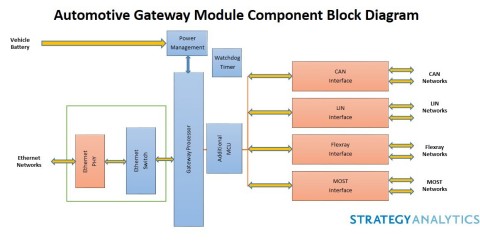Performance focused requirements will semiconductor demand to $2.5 billion
Automotive gateway modules serve as bridges across the disparate domains and communications protocols in a vehicle E/E (electronic/electrical) architecture, translating data and allowing the various ECUs in a vehicle to share and use information across the powertrain, body, chassis, safety and driver information domains. The Strategy Analytics Powertrain Body Chassis and Safety (PBCS) service report, “Gateway Module Market Outlook 2018 – 2027: Evolving Vehicle Architectures to Dictate Performance Focused Requirements (http://sa-link.cc/1rC)” finds that the use of central automotive gateway modules has grown in line with the growing complexity of vehicle electronics, serving to increase global penetration of central automotive gateway modules to almost 100% by 2027.

Infineon, NXP, Renesas, STMicroelectronics and Texas Instruments are the leading suppliers of MCUs and SoCs, and together with automotive grade Ethernet PHYs and switches from Broadcom and Marvell, serve to support automotive gateway module suppliers such as Bosch, Continental, Denso, FEV Europe Group, HiRain Technologies, Hitachi Automotive Systems and Huawei.
The “Gateway Module Market Outlook 2018 – 2027: Evolving Vehicle Architectures to Dictate Performance Focused Requirements” report profiles these system and semiconductor suppliers as well as detailing the market outlook for gateway modules and associated semiconductor demand. Gateway module system shipments are forecast to grow at a CAAGR of 23.5% over 2019 – 2024 with the associated semiconductor demand growing to $2.5 billion by 2027.
“While new technology trends in the automotive industry typically start with penetration at premium marques, the implementation of automotive gateway modules is being driven by volume-focused OEMs such as Ford, Toyota and VW, and is seen as an investment that will enable service-oriented offerings and help vehicles to be made more efficiently and cheaply,” notes Asif Anwar , report author and PBCS Service Director. “Over the next several years, this emphasis combined with a range of other factors will coalesce to push gateway module computing from MCU (microcontroller)-based to SoC (system-on-chip)-based processing.”
Mr. Anwar continued, “While the traditional E/E distributed architecture will continue to be underpinned by legacy heterogeneous automotive network technologies, the push towards higher bandwidth will be enabled by Ethernet serving as the backbone. As the automotive gateway module becomes the central focal point for increasing volumes of data, issues of security including cybersecurity and the use of software and hypervisors will also become central to the automotive gateway module offering.”
TCL Diwali Grand Content Offer: Binge Watch Unlimited Content on TCL Channel













